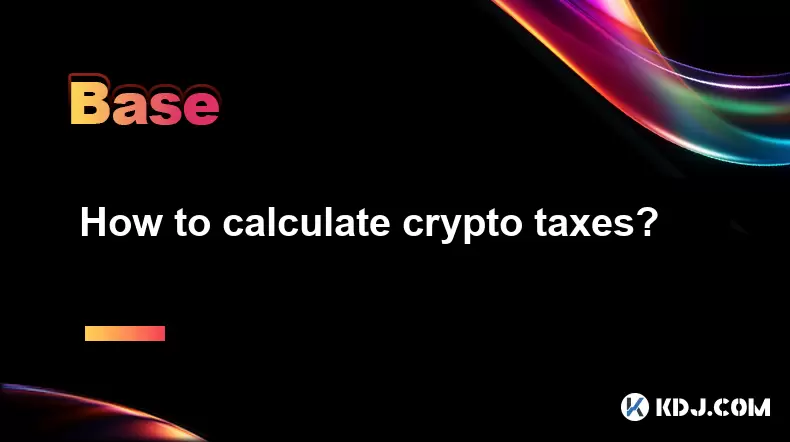-
 bitcoin
bitcoin $87959.907984 USD
1.34% -
 ethereum
ethereum $2920.497338 USD
3.04% -
 tether
tether $0.999775 USD
0.00% -
 xrp
xrp $2.237324 USD
8.12% -
 bnb
bnb $860.243768 USD
0.90% -
 solana
solana $138.089498 USD
5.43% -
 usd-coin
usd-coin $0.999807 USD
0.01% -
 tron
tron $0.272801 USD
-1.53% -
 dogecoin
dogecoin $0.150904 USD
2.96% -
 cardano
cardano $0.421635 USD
1.97% -
 hyperliquid
hyperliquid $32.152445 USD
2.23% -
 bitcoin-cash
bitcoin-cash $533.301069 USD
-1.94% -
 chainlink
chainlink $12.953417 USD
2.68% -
 unus-sed-leo
unus-sed-leo $9.535951 USD
0.73% -
 zcash
zcash $521.483386 USD
-2.87%
如何计算加密税税?
Cryptocurrency transactions like selling, trading, or spending can trigger taxable events, requiring accurate reporting to avoid penalties.
2025/07/08 10:00

了解加密货币税的基础知识
由于数字资产和监管框架的不断发展的性质,加密货币税收可能很复杂。在包括美国在内的许多司法管辖区中,加密货币被视为出于税收目的而不是货币的财产。此分类意味着资本收益和损失与股票或房地产相似。每次您处置加密货币(无论是通过销售,交易还是支出),都可能触发应税事件。
像国税局(IRS)(国税局)这样的政府要求个人报告其年度纳税申报表的所有加密交易。不这样做会导致处罚,审计或法律后果。重要的是要了解什么构成应税事件以及如何准确计算相关的收益或损失。
确定加密交易中应税事件
并非每项加密交易都是应纳税的,但是大多数税务机关将几项诉讼视为应纳税事件。其中包括:
- 出售法定货币加密货币(例如,美元)
- 将一种加密货币交易为另一种加密货币(例如,BTC到ETH)
- 使用加密购买商品或服务
- 收到加密作为收入(例如,薪水,积分奖励,空投)
这些场景中的每一个都需要仔细的跟踪和文档。例如,如果您收到Bitcoin作为自由职业者的付款,则在收到的日期以其公平的市场价值为普通收入。同样,如果您将以太坊交易为Solana,则必须根据获得以太坊和将其交易时的价值差异来计算任何资本收益或损失。
收集必要的交易数据
要正确计算加密税,您需要所有交易的详细记录。关键数据点包括:
- 收购日期(当您购买或收到加密货币时)
- 成本基础(您支付了多少,包括费用,以获取加密货币)
- 处置日期(当您出售,交易或度过加密货币时)
- 收益(以菲亚特或加密价值为单位,您从处置中获得了多少)
许多用户使用加密税款软件,例如共同介绍,koinly或crypto.com税来自动化此过程。这些平台与交易所和钱包集成在一起,以进口交易历史,计算收益/损失并产生税收报告。但是,也可以使用电子表格进行手动跟踪,尤其是对于交易较少的用户而言。
计算资本收益和损失
计算资本收益或损失的公式很简单:
资本收益/损失=收益 - 成本基础例如,如果您以2,000美元的价格购买了1张ETH,然后以3,000美元的价格出售了它,您的资本收益将为1,000美元。如果您在销售前拥有一年以上的资产,则可能有资格获得长期资本收益利率,通常低于短期利率。持有期在确定您的纳税责任方面至关重要。
不同国家对成本基础方法有不同的规定。常见方法包括:
- 首先,首先(FIFO):假设您首先出售最古老的硬币
- 最后,首先(LIFO):假设您首先出售最新的硬币
- 具体标识:允许您准确选择出售哪些硬币
选择正确的方法可能会影响您的整体税收责任,因此重要的是要了解您的管辖权允许哪种方法,哪些方法可能对您的情况最有益。
向官方表格报告加密税
在美国,纳税人必须回答关于1040表格的问题,询问他们在这一年中是否从事任何虚拟货币交易。即使您仅持有加密货币而没有进行交易,但仍需要根据当地的指导来回答“是”。
此外,附表D和表格8949用于报告加密交易中的资本收益和损失。表格8949提供了每次销售或交易所的详细细分,包括日期,收益,成本基础和损益金额。准确的报告对于避免对税务机构的未来并发症至关重要。
一些平台提供预先填充的税收表或摘要,可以将可以直接导入到Turbotax或Taxact等税收软件中。始终仔细检查自动报告的准确性,尤其是如果您全年都使用多个交易所或钱包。
常见问题(常见问题解答)
问:如果我只买了加密货币而没有出售任何东西,我是否欠税款?答:简单地持有加密货币而不出售或处置它通常不会触发应税事件。但是,作为收入或钱包之间的收入或转移,根据管辖权,收入或转移可能仍具有税收影响。
问:如何处理加密货币交易来进行税收目的?答:从一个加密货币到另一种加密货币的每种交易都被认为是原始资产的处置。您必须根据交易时原始资产的价值来计算收益或损失。
问:如果我在加密货币投资上亏损怎么办?答:资本损失可用于抵消资本收益。如果您的损失超过了您的收益,则根据您国家的税法,您可以从普通收入中扣除一定数量。
问:在我自己的钱包之间移动加密货币是否有税收影响?答:在您个人控制的钱包之间转移加密通常不是应税事件。没有发生处置,因此未能确认收益或损失。
免责声明:info@kdj.com
所提供的信息并非交易建议。根据本文提供的信息进行的任何投资,kdj.com不承担任何责任。加密货币具有高波动性,强烈建议您深入研究后,谨慎投资!
如您认为本网站上使用的内容侵犯了您的版权,请立即联系我们(info@kdj.com),我们将及时删除。
- MYX 在市场疲软中反弹,但仍对持续势头感到担忧
- 2026-02-03 06:55:02
- Kaspa 的 0.03 美元边缘:一位分析师在基本面押注 100,000 美元,否则就会破产
- 2026-02-03 07:00:01
- Sleep Token Drummer II 在格莱美提名和专辑成功中称霸 Drumeo 奖
- 2026-02-03 07:40:02
- 比特币价格引导市场趋势:美联储的担忧、机构转变和科技的双刃剑
- 2026-02-03 04:40:02
- 开始你的游戏:《辐射》琐事、当地活动、免费饮料 - 荒原的召唤!
- 2026-02-03 04:35:01
- 修复您的核子可乐:辐射琐事,一场精彩的当地活动,免费饮料让交易更加甜蜜!
- 2026-02-03 04:40:02
相关百科

加密货币和区块链技术的未来是什么?
2026-01-11 21:19:34
去中心化金融的演变1. DeFi 协议已经从简单的借贷扩展到包括结构性产品、保险机制和衍生品交易。 2. 智能合约审计变得更加严格,多公司验证流程现已成为主要协议发布的标准。 3. 跨链互操作解决方案现在支持 40 多个不同的区块链网络,无需中心化桥梁即可实现资产转移。 4. 收益聚合策略已经发展到...

中本聪是谁? (Bitcoin 的创造者)
2026-01-12 07:00:05
笔名的由来1. Satoshi Nakamoto 是开发 Bitcoin、撰写其原始白皮书并设计和部署其第一个实现的个人或团体使用的名称。 2. 该名称首次出现于 2008 年,当时一份名为“Bitcoin:点对点电子现金系统”的白皮书被发布到密码学邮件列表中。 3. 尚未确认可验证的身份,所有已知...

什么是加密货币空投以及如何获得?
2026-01-22 14:39:35
了解加密货币空投1. 加密空投是向多个钱包地址分配免费代币或代币,通常由区块链项目发起,以提高知名度、奖励早期支持者或分散代币所有权。 2. 这些分配可能不需要任何前期成本,尽管有些分配需要最低限度的参与,例如持有特定的加密货币、关注社交媒体帐户或加入社区渠道。 3. 空投通常与协议升级、主网启动或...

什么是 DeFi 中的无常损失以及如何避免它?
2026-01-13 11:59:34
了解无常损失1. 当存入自动做市商(AMM)流动性池的代币价值与外部持有的代币价值出现偏差时,就会发生无常损失。 2. 出现这种现象的原因是大多数AMM采用恒定乘积公式,池内代币价格的比例必须与外部市场价格保持一致。 3. 当一对资产中的一种资产相对于另一种资产大幅升值时,套利者通过购买较便宜的资产...

如何桥接不同区块链之间的加密资产?
2026-01-14 18:19:42
跨链桥机制1. 原子交换实现了两个区块链之间直接的点对点资产交换,无需中介,依靠哈希时间锁定合约来保证公平性和最终性。 2. 可信桥通过中心化或半中心化托管人进行操作,这些托管人持有用户存款并在目标链上铸造包装代币。 3. 去信任桥使用智能合约和加密证明(例如轻客户端或零知识验证)来验证状态转换,而...

什么是白皮书以及如何阅读白皮书?
2026-01-12 07:19:48
了解白皮书结构1. 加密货币领域的白皮书充当基础技术和概念文件,概述了区块链项目的目的、架构和机制。 2. 通常以摘要或执行摘要开始,介绍项目旨在解决的问题和建议的解决方案。 3. 引言部分定义了核心术语,在现有技术或经济限制范围内建立了背景,并引用了先前的工作或类似系统。 4. 技术规范如下,详细...

加密货币和区块链技术的未来是什么?
2026-01-11 21:19:34
去中心化金融的演变1. DeFi 协议已经从简单的借贷扩展到包括结构性产品、保险机制和衍生品交易。 2. 智能合约审计变得更加严格,多公司验证流程现已成为主要协议发布的标准。 3. 跨链互操作解决方案现在支持 40 多个不同的区块链网络,无需中心化桥梁即可实现资产转移。 4. 收益聚合策略已经发展到...

中本聪是谁? (Bitcoin 的创造者)
2026-01-12 07:00:05
笔名的由来1. Satoshi Nakamoto 是开发 Bitcoin、撰写其原始白皮书并设计和部署其第一个实现的个人或团体使用的名称。 2. 该名称首次出现于 2008 年,当时一份名为“Bitcoin:点对点电子现金系统”的白皮书被发布到密码学邮件列表中。 3. 尚未确认可验证的身份,所有已知...

什么是加密货币空投以及如何获得?
2026-01-22 14:39:35
了解加密货币空投1. 加密空投是向多个钱包地址分配免费代币或代币,通常由区块链项目发起,以提高知名度、奖励早期支持者或分散代币所有权。 2. 这些分配可能不需要任何前期成本,尽管有些分配需要最低限度的参与,例如持有特定的加密货币、关注社交媒体帐户或加入社区渠道。 3. 空投通常与协议升级、主网启动或...

什么是 DeFi 中的无常损失以及如何避免它?
2026-01-13 11:59:34
了解无常损失1. 当存入自动做市商(AMM)流动性池的代币价值与外部持有的代币价值出现偏差时,就会发生无常损失。 2. 出现这种现象的原因是大多数AMM采用恒定乘积公式,池内代币价格的比例必须与外部市场价格保持一致。 3. 当一对资产中的一种资产相对于另一种资产大幅升值时,套利者通过购买较便宜的资产...

如何桥接不同区块链之间的加密资产?
2026-01-14 18:19:42
跨链桥机制1. 原子交换实现了两个区块链之间直接的点对点资产交换,无需中介,依靠哈希时间锁定合约来保证公平性和最终性。 2. 可信桥通过中心化或半中心化托管人进行操作,这些托管人持有用户存款并在目标链上铸造包装代币。 3. 去信任桥使用智能合约和加密证明(例如轻客户端或零知识验证)来验证状态转换,而...

什么是白皮书以及如何阅读白皮书?
2026-01-12 07:19:48
了解白皮书结构1. 加密货币领域的白皮书充当基础技术和概念文件,概述了区块链项目的目的、架构和机制。 2. 通常以摘要或执行摘要开始,介绍项目旨在解决的问题和建议的解决方案。 3. 引言部分定义了核心术语,在现有技术或经济限制范围内建立了背景,并引用了先前的工作或类似系统。 4. 技术规范如下,详细...
查看所有文章





















![[全文] 我的祖父把他的“毫无价值”的钱币收藏留给了我,所以我的堂兄弟们笑了...... [全文] 我的祖父把他的“毫无价值”的钱币收藏留给了我,所以我的堂兄弟们笑了......](/uploads/2026/02/03/cryptocurrencies-news/videos/origin_6981155e6571d_image_500_375.webp)




















































